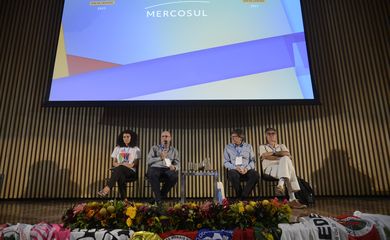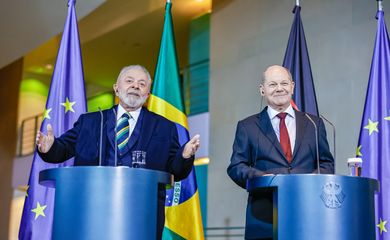In letter to Mercosur leaders, activists call for leading role

Activists from grassroots movements took center stage on Tuesday (Dec. 5) at Rio’s Museum of Tomorrow as they read the final letter of Mercosur’s Social Summit. The document, which brings together social demands and public policy proposals, will be delivered to the presidents of the countries that are part of the economic bloc. The letter highlights the defense and strengthening of democracy, regional integration, respect for minorities, the fight against discrimination, sustainable development, environmental preservation, family farming, and the fight against hunger.

“We demand that instruments within Mercosur be strengthened in order to guarantee and protect human rights as an inviolable principle for governments and different actors. We need to make progress in Mercosur, which is moving towards consolidating regional integration with a deepening of democracy and a commitment to tackling climate change and the ‘financialization’ of nature; the fight against hunger and the guarantee of food sovereignty; overcoming racial, ethnic, economic, and gender inequalities, and those affecting sexual dissidence,” the document reads.
Reparation policies for black people and the defense of indigenous and native groups were also highlighted during the two days of meetings and discussion tables. The activists also criticized the free-trade agreement being discussed between Mercosur and the European Union, further arguing that the terms being negotiated jeopardize “the wisdom of our peoples and territories.”
The letter written by representatives of society will be delivered to the presidents of the Mercosur member countries—Argentina, Brazil, Paraguay and Uruguay—during the summit meeting to be held in the same venue Thursday (7).
Social participation
Mariana Duarte, representative of the Union of Black Men and Women for Equality (Unegro), was one of the women who read the text on stage. She argues that there can be no transformation in a society without the participation of social movements.
“I hope the head of state receives the document, reads it, and builds the next paths for Mercosur based on what the social movement is proposing,” said the activist, who is also vice-president of the National Council for the Promotion of Racial Equality, which traveled from Salvador to Rio de Janeiro for the meeting.
This week’s discussions represent a comeback, the activists believe. Mercosur’s Social Summit had not been held as an in-person gathering for seven years. Participants at this edition celebrated the resumption of a focus on social participation, insisting on its institutionalization, so that it becomes a lasting practice.
Uruguayan Eugenia Godoy attended the meeting representing the Popular Participation Movement (MPP), an organization founded in the neighboring country at the end of the 1980s by then activist José Mujica, who went on to become president of Uruguay (2010–2015).
In her view, people’s demands and those of social organization groups should not be left to sporadic meetings. “There needs to be a constant space for demands to be heard,” she stated.
The National Secretary for Social Participation of the president’s Secretariat-General, Renato Simões, highlighted the initiative to bring back the Social Summit during Brazil’s pro tempore presidency of Mercosur.
“It is social participation that consolidates and expands rights. Rights are born from the participation of the disenfranchised. How do you establish a right? It is established the moment the struggle of those who do not have this right gains a universal level of recognition,” he said.
Mercosur
Mercosur is a regional integration initiative that began in 1991 and was initially formed by Brazil, Argentina, Paraguay, and Uruguay. In the following decades, the entry of Venezuela and Bolivia was approved. Since 2017, Venezuela has been suspended for failing to comply with the bloc’s democratic clauses. Bolivia has not yet completed the entry process, but has been approved by the parliaments of the other countries. The associated countries are Chile, Colombia, Ecuador, Guyana, Peru, and Suriname.
The bloc covers an area of 14,869,775 square kilometers—with Brazil comprising 57 percent—and a population of 295 million, more than 200 million of whom are Brazilian.






